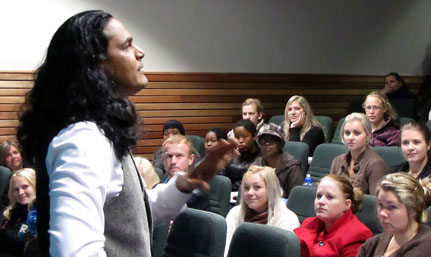Latest News Archive
Please select Category, Year, and then Month to display items
19 November 2018
|
Story Charlene Stanley
|
Photo Charlene Stanley
 Prof John Mubangizi, Dean of the Faculty of Law, encouraged delegates at the Fifth Annual International Mercantile Conference to share ideas on best international practice in their various fields.
Prof John Mubangizi, Dean of the Faculty of Law, encouraged delegates at the Fifth Annual International Mercantile Conference to share ideas on best international practice in their various fields.
“Don’t say anything online that you wouldn’t want plastered on a billboard with your face on it.”
This famous quote by international tech expert Erin Bury should be a guiding light when it comes to online habits in the workplace, according to Francois Cilliers, UFS Lecturer in Mercantile Law.
In his presentation Could Social Media be the Gateway to Employment Discrimination? he warned that employees have a responsibility not to bring their employers in disrepute through their comments on social media.
“Posts, updates, tweets, and comments are considered to be publications and can therefore never be seen as privileged information,” he explained.
Responsibility on employees and employers alike
He pointed out that employers also had a responsibility regarding the way in which they use the information about prospective employees obtained via social media.
“Nowadays, approximately 75% of companies hire through social media. In the US, recruiting companies spend hours researching candidates, making full use of what they can find on social media. It was found that 50–80% of employers frowned upon posts and pictures featuring drug and alcohol abuse, profanity, and bad grammar.”
He warned that employers needed to tread lightly, as a decision not to employ someone as a result of information on the prospective employee’s political views and sexual orientation could constitute unfair discrimination as set out in the Employment Equity Act.
“An employer who wishes to use a screening process (utilising social media) has to prove that the information and the process is objectively necessary and can be justified with reference to the inherent requirements of the job,” he explained.
“As technology and electronic systems advance, so too should the applicable labour laws.”
Cilliers’ presentation formed part of the Fifth Annual International Mercantile Law Conference recently hosted by the Faculty of Law on the Bloemfontein Campus.
Incorporating new technology in teaching and research
“This conference is an opportunity to share ideas on best practice in what is perceived as a ‘difficult’ field within Law,” said Prof John Mubangizi, Dean of the Faculty of Law, as he opened the proceedings. Topics in the discussion sessions ranged from Racism in the workplace and The underrepresentation of females in the judiciary, to Decriminalisation of cannabis: A recipe for healthy employer-employee relations?
“Conferences such as these help us to take advantage of the newest developments in technology to advance our teaching and research,” said Prof Mubangizi.
“To quote Einstein: ‘We can’t solve problems by using the same kind of thinking we used when we created them.’”
UFS students visit schools in Bloemfontein
2011-07-29
|

|
Prof Dennis Francis, Dean of our Faculty of Education, talks to first year students at a diversity workshop presented by our Faculty of Education
Photo: Amanda Tongha |
Education students from our university descended on schools in Bloemfontein during the last two days. Approximately 520 first-year education students, divided into two groups, are visiting schools in the city to get a broader teaching experience. The first-year students are visiting schools in town, Heidedal and Mangaung. Their visit coincides with our Faculty of Education’s annual diversity workshop for first-year students, where they will address topics such as discrimination, prejudice and stereotypes.
The first group of first-year students who visited schools, gave feedback about their experiences at the diversity workshop held on our Bloemfontein Campus. The students were addressed by Prof. Dennis Francis, Dean of our Faculty of Education. He told them that a Kovsie graduate is somebody who is people-centred. Prof. Francis urged the first-year students to let go of prejudice and asked them to reclaim the dignity of the oppressed.